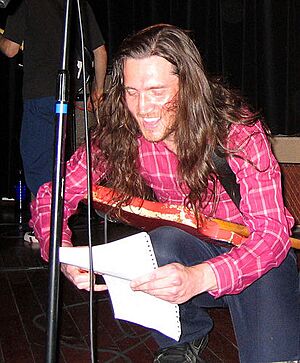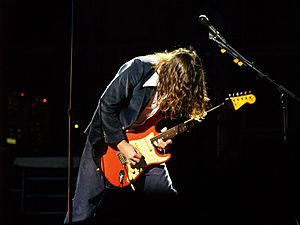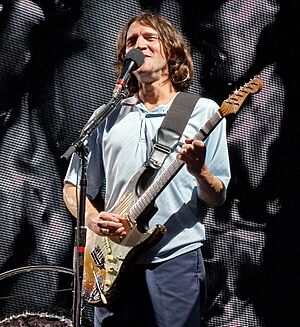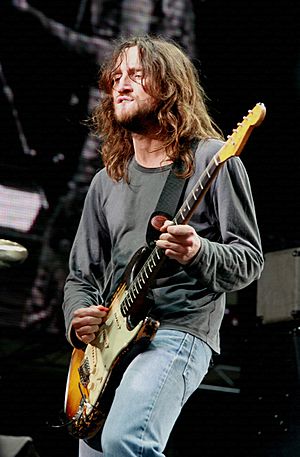John Frusciante facts for kids
Quick facts for kids
John Frusciante
|
|
|---|---|
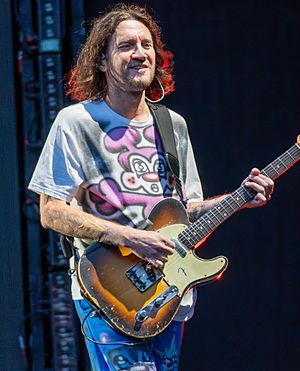
Frusciante performing in 2023
|
|
| Background information | |
| Birth name | John Anthony Frusciante |
| Also known as | Trickfinger |
| Born | March 5, 1970 New York City, U.S. |
| Genres | |
| Occupation(s) |
|
| Instruments |
|
| Years active | 1988–present |
| Labels |
|
John Anthony Frusciante (born March 5, 1970) is an American musician. He is best known as the guitarist for the famous band Red Hot Chili Peppers. He has been a member of the band three different times.
Besides his work with the Chili Peppers, John Frusciante has released many solo albums and EPs. His music styles vary a lot, from quiet acoustic guitar songs to energetic electronic music. In 2012, he was added to the Rock and Roll Hall of Fame as a member of the Red Hot Chili Peppers. The magazine Rolling Stone also named him one of the greatest guitarists of all time.
John joined the Red Hot Chili Peppers when he was 18. This was after their previous guitarist, Hillel Slovak, passed away. John's first album with the band was Mother's Milk (1989). Their next album, Blood Sugar ... Magik (1991), became a huge success. However, John felt overwhelmed by the band's sudden fame and left in 1992.
After leaving, he released his first solo albums: Niandra LaDes and Usually Just a T-Shirt (1994) and Smile from the Streets You Hold (1997). In 1998, he rejoined the Chili Peppers. They went on to have massive success with albums like Californication (1999), By the Way (2002), and Stadium Arcadium (2006).
John Frusciante's solo music explores many genres. These include experimental rock, ambient music, and electronica. In 2004, he released six albums, each trying out different music styles. He left the Chili Peppers again in 2009 but returned in 2019. He also makes electronic music under the name Trickfinger. With other musicians, he has released two albums as part of the band Ataxia.
Contents
- Early Life and Musical Beginnings
- Music Career Highlights
- Joining the Red Hot Chili Peppers (1988–1992)
- Leaving the Chili Peppers (1992)
- Returning to the Chili Peppers (1998–2002)
- New Projects and Stadium Arcadium (2002–2007)
- Second Departure and The Empyrean (2007–2009)
- Focus on Electronic Music (2010–2019)
- Third Time with the Chili Peppers (2019–Present)
- Working with Omar Rodríguez-López
- John Frusciante's Musical Style
- Personal Life
- Discography
- See also
Early Life and Musical Beginnings
John Frusciante was born in Queens, New York City, on March 5, 1970. His father, John Augustus Frusciante, was a talented pianist who later became a lawyer and judge. His mother, Gail Bruno, was a singer. John's family has Italian roots.
His family moved around, living in Arizona and Florida. After his parents separated, John and his mother moved to Santa Monica, California. A year later, they moved to Mar Vista, Los Angeles. John says his stepfather really supported his artistic dreams.
He became interested in the Los Angeles punk rock music scene. When he was nine, he loved the band The Germs. He would listen to their album (GI) over and over.
At age 11, John started learning from famous guitarists like Jeff Beck, Jimmy Page, David Gilmour, and Jimi Hendrix. He also studied the music of Frank Zappa for hours. John left high school at 16 with his parents' permission. He moved to Los Angeles to focus on his music. He briefly attended the Guitar Institute of Technology but left soon after.
Music Career Highlights
Joining the Red Hot Chili Peppers (1988–1992)
John Frusciante first learned about the Red Hot Chili Peppers around 1984. His guitar teacher was trying out to be their guitarist. John went to a Chili Peppers concert when he was 15 and quickly became a huge fan. He admired their guitarist, Hillel Slovak, and learned almost all the guitar parts from their first three albums.
John became friends with former Dead Kennedys drummer D. H. Peligro in 1988. They jammed together, and Peligro invited Red Hot Chili Peppers bassist Flea. John and Flea instantly connected musically. Around this time, John considered trying out for Frank Zappa's band, but changed his mind.
When Hillel Slovak died in 1988, the Chili Peppers' drummer, Jack Irons, left the band. Flea and singer Anthony Kiedis brought in Peligro on drums and DeWayne "Blackbyrd" McKnight on guitar. However, McKnight didn't quite fit the band's musical style. Flea suggested auditioning John Frusciante. John's deep knowledge of the band's songs impressed them.
Flea and Kiedis agreed that John was the right choice. When Flea called John to tell him he was in, John was so excited he ran through his house screaming! He was about to sign a contract with another band, but joining the Chili Peppers changed his plans.
John wasn't a funk player before joining. He learned how to play well with Flea by studying Hillel's style. A few weeks later, Peligro was fired, and Chad Smith joined as the new drummer. This new lineup recorded their first album, Mother's Milk (1989). John tried to play like Hillel, but the producer wanted a heavier, more metal sound. John and the producer often disagreed about the guitar sound.
The Chili Peppers worked with producer Rick Rubin for their next album, Blood Sugar ... Magik (1991). Rubin wanted to record the album in a unique place, so they chose an old mansion in Hollywood Hills. John, Kiedis, and Flea lived there during the recording.
Leaving the Chili Peppers (1992)
Blood Sugar ... Magik was a huge success, selling millions of copies. The Red Hot Chili Peppers became rock stars overnight. John was surprised by the fame and found it hard to handle. He started to dislike how popular the band had become. He often argued with Kiedis after concerts, saying they were "too popular."
John felt that his path was leading him away from the band. On May 7, 1992, before a show in Tokyo, he told his bandmates he was leaving. He was convinced to play that night but flew back to California the next morning. He said it was impossible for him to stay in the band any longer. He was replaced by guitarist Dave Navarro.
After leaving, John even tried out for the band Meat Puppets. The band's bassist, Cris Kirkwood, said John showed up barefoot with his guitar. They jammed, but it didn't quite work out.
Returning to the Chili Peppers (1998–2002)
In late 1996, John started living a more focused and healthy lifestyle. He changed his diet and began practicing vipassana meditation and yoga. He learned how self-discipline could affect his body and mind. He later stopped yoga due to back issues but still meditates daily.
In early 1998, the Red Hot Chili Peppers fired guitarist Dave Navarro and were close to breaking up. Flea told Kiedis that the only way they could continue was if John rejoined. Kiedis and Flea decided to ask him back. When Flea visited John and asked him to rejoin, John cried with happiness and said nothing would make him happier.
The band then started recording their seventh album, Californication, released in 1999. John's return brought back a key part of the band's sound and boosted their spirits. His deep love for music influenced how they recorded the album. John often says his work on Californication is his favorite.
During the Californication world tour, John kept writing new music. Much of this became his third solo album, To Record Only Water for Ten Days (2001). This album was different from his earlier solo work, focusing more on electronic and new wave sounds. He used many synthesizers on the record.
In 2001, John began recording his fourth album with the Red Hot Chili Peppers, By the Way (2002). He felt this was one of the happiest times in his life. He wanted to keep writing better songs. While working on By the Way, he also wrote most of what would become his solo album Shadows Collide with People. He wanted to play guitar like musicians who focused on textures and good chords, not just fast techniques.
New Projects and Stadium Arcadium (2002–2007)
John wrote and recorded many songs during and after the By the Way tour. In February 2004, he started a side project called Ataxia with Joe Lally and Josh Klinghoffer. They recorded for about two weeks and played two shows before stopping. Later that year, five of John's songs were used in The Brown Bunny movie soundtrack.
John released his fourth solo album, Shadows Collide with People, on February 24, 2004. It featured his friends, including Josh Klinghoffer, and bandmates Chad Smith and Flea. In June 2004, he announced he would release six records over six months. These included The Will to Death, Ataxia's Automatic Writing, DC EP, Inside of Emptiness, A Sphere in the Heart of Silence, and Curtains. He wanted to record these quickly and cheaply using old-fashioned analog tape, avoiding modern computer tools.
In early 2005, John started working on his fifth album with the Red Hot Chili Peppers, Stadium Arcadium. His guitar playing is very important throughout this album, and he sings backing vocals on most songs. He used a lot of different sounds and playing styles, mixing the funk of Blood Sugar ... Magik with the melodies of By the Way. He also let songs develop from jam sessions and improvised most of his guitar solos. Many reviews noted the influence of Jimi Hendrix in his solos. He also used more guitar effects and instruments like synthesizers.
John also started working with his friend Omar Rodríguez-López and his band the Mars Volta. He played guitar and electronic instruments on their albums. In return, Rodríguez-López played on some of John's solo albums and on Stadium Arcadium.
Second Departure and The Empyrean (2007–2009)
Ataxia released its second and final album, AW II, in 2007. After the Stadium Arcadium tour ended in 2007, the Red Hot Chili Peppers decided to take a break. In early 2008, Anthony Kiedis confirmed they were exhausted from constant work. John Frusciante quietly left the band on July 29, 2009. He didn't announce it publicly until December 2009, after the band had already started working on their next album with Josh Klinghoffer as their new guitarist.
John's tenth solo album, The Empyrean, came out on January 20, 2009. This was a concept album that he worked on between 2006 and 2008. The Empyrean featured many musicians, including his Chili Peppers bandmate Flea, friends Josh Klinghoffer, and former Smiths guitarist Johnny Marr.
Focus on Electronic Music (2010–2019)
After leaving the Red Hot Chili Peppers, John focused on making electronic music. He learned how to program instruments used in acid house music. He wrote that his rock music skills were not needed anymore. He was excited to find new ways to create music. During this time, John formed an electronic trio called Speed Dealer Moms. Their first EP was released in 2010.
John released an EP called Letur-Lefr on July 17, 2012. This EP was very different from his guitar-focused albums. It had elements of abstract electronica, pop, and hip hop. On September 25, 2012, he released his ninth studio album, PBX Funicular Intaglio Zone. In 2013, he released an instrumental song called "Wayne" in memory of a friend.
His fifth EP, Outsides, was released in August 2013. That year, he also produced an album for the hip hop group Black Knights. John was also part of a project called Kimono Kult. Their first EP came out in March 2014. John released his tenth studio album, Enclosure, on April 8, 2014. In April 2015, he released his first album under his Trickfinger alias, exploring the acid house genre.
In 2016, John released an electronic music EP called Foregrow. This EP included a song for a movie and three instrumental tracks. In November 2015, John announced that he was releasing free unreleased songs from 2008 to 2013 online. He also clarified that he was not retiring from music, saying his words were taken out of context. He explained that he makes music without a specific audience in mind.
On June 13, 2017, John, as Trickfinger, announced his second album, Trickfinger II. The six songs on it were recorded in 2007 and were not originally meant to be released.
Third Time with the Chili Peppers (2019–Present)
On December 15, 2019, the Red Hot Chili Peppers announced that John Frusciante had rejoined the band. He replaced Josh Klinghoffer. The band had been working on a new album with Klinghoffer but hadn't made much progress. John said that Flea suggested he rejoin, and he started thinking about writing rock music again. He felt it would be "terrible" if any of them passed away without him being back in the band.
Josh Klinghoffer said there were no hard feelings about his departure. He felt it was "absolutely John's place to be in that band." Flea also said that it was easier to work with John musically.
On February 8, 2020, John performed with the Chili Peppers for the first time in 13 years. This was at a memorial service. John said it was exciting to play guitar again after focusing on electronic music for years. Unlimited Love, the Red Hot Chili Peppers' twelfth studio album and their first with John in 16 years, was released on April 1, 2022. On June 4, the band started a big international stadium tour. On October 14, 2022, the Chili Peppers released their thirteenth album, Return of the Dream Canteen, which was recorded during the same sessions as Unlimited Love.
In 2020, John released two EPs, Look Down, See Us and She Smiles Because She Presses the Button, under his Trickfinger name. He also released the electronic album Maya under his real name. He said he was less interested in singing and writing lyrics, and enjoyed working with machines and computers. John and Flea also covered a song for a tribute album to the band Gang of Four in 2021. On February 3, 2023, John released two versions of an ambient solo record, I and II. He said he needed to clear his head after a year and a half of writing rock music.
Working with Omar Rodríguez-López
John Frusciante has played guitar on five Mars Volta albums. He also played on Omar Rodríguez-López's solo albums. John was also an executive producer for Rodríguez-López's film, The Sentimental Engine Slayer. In May 2010, John and Rodríguez-López released two albums together. One was just the two of them, and the other was a quartet album.
In 2012, Omar Rodríguez-López said that John was in a different place in his life. He said John didn't care about releasing music as a "product" anymore.
John Frusciante's Musical Style
John Frusciante's guitar style has changed over his career. At first, he was recognized for his guitar work, but later, music critics and other guitarists truly appreciated it. In 2003, Rolling Stone magazine ranked him 18th on their list of the "100 Greatest Guitarists of All Time." John says this recognition came from his focus on rhythm and melody, inspired by complex music from Jimi Hendrix and Eddie Van Halen.
His sound often comes from his love for vintage guitars. All the guitars he owns and uses for recording and touring were made before 1970. He chooses a specific guitar for each song. The first guitar he bought after rejoining the Chili Peppers was a 1962 red Fender Jaguar. His most used guitar is a 1962 Sunburst Fender Stratocaster. Anthony Kiedis gave it to him as a gift when he rejoined the band in 1998. He has used this guitar on every album and tour since then. He also has a 1955 Fender Stratocaster. Another prized instrument is a 1955 Gretsch White Falcon, which he used for specific songs during shows. For his acoustic music, he mostly uses a 1950s Martin 0–15.
After leaving the Red Hot Chili Peppers, he started using a Yamaha SG as his main guitar for solo work. He said it helped him sound like guitarists who used Les Pauls. He also uses the Roland MC-202 a lot for his electronic music. He feels he thinks like a "202ist" as much as a guitarist.
With the Red Hot Chili Peppers, John sings backing vocals in a high voice, a style he started on Blood Sugar ... Magik. He enjoys being a backing vocalist, calling it a "real art form." He believes his work with the band should be separate from his solo projects.
Playing Techniques
John Frusciante's guitar playing focuses on good melody, tone, and song structure, rather than just showing off fast playing. He feels that guitar playing hasn't changed much since the 1960s, and the best players from that time are still unmatched. When he was young, many guitarists focused on speed. Because of this, he thinks the skills of many punk and new wave guitarists were ignored. He tries to highlight the melodic playing of artists like Matthew Ashman and Bernard Sumner.
He likes guitarists who explore new ideas with the instrument. He thinks many modern guitarists are not original and "follow the rules with no risk." John also likes to play with a "grimy" sound, using different types of distortion. He tries to break musical "boundaries" to expand his music.
John became serious about creating electronic music in 2007. As he got better with electronic instruments, he felt comfortable adding R&B and hip hop music elements to his work. He said these new techniques influenced his EP, Letur-Lefr. For PBX Funicular Intaglio Zone, he looked for new ways to play guitar with the new music styles he was studying. He now sees the computer as an instrument and combines old and new recording techniques.
His approach to making albums has changed. On his early recordings, he didn't mind small mistakes. But on later albums, he wanted everything to be perfect. John believes songwriting takes time and he doesn't force it. Much of his solo music is first written on an acoustic or unplugged electric guitar. He prefers to record his albums on analog tapes and older equipment. He thinks older gear can make recording faster, and modern computer tools only give the illusion of efficiency. He likes the challenge of recording quickly and believes music comes alive when created fast. He uses Renoise as his main digital audio workstation, along with drum machines, sequencers, and synthesizers.
Musical Influences
John Frusciante's first big influence was Jimi Hendrix. After seeing the Red Hot Chili Peppers in 1985, their guitarist Hillel Slovak became his second major influence. While Hendrix and Slovak were very important, John was also inspired by glam rock artists like David Bowie and T. Rex. He also liked experimental artists such as Syd Barrett, Captain Beefheart, the Residents, the Velvet Underground, Neu!, Frank Zappa, and Kraftwerk. John mentions progressive rock bands like Genesis, King Crimson, and Yes in many interviews. He even wrote an essay for a Yes box set.
He credits Greg Ginn, Pat Smear, and Joe Strummer for inspiring him to learn guitar. As a teenager, he focused on Hendrix and bands like Public Image Ltd., the Smiths, and XTC. Another big influence was John McGeoch from Magazine and Siouxsie and the Banshees. John says McGeoch has a brilliant idea for each song. He also mentioned Steve Howe as his favorite guitarist in his early teens.
John explains his interest in certain guitarists:
I like all kinds of guitar players, but it's people like the ones I just mentioned [Matthew Ashman of Bow Wow Wow and Bernard Sumner of Joy Division] whose playing really amazes me, and it's because of their ideas, it's because of what they thought. It's because they approached the instrument differently than anybody else. It's people like Keith Levene from Public Image and Daniel Ash in Bauhaus who are exploring the possibilities of what you can do with the guitar, whereas other people seem like they're just exploring what you can physically do, and that serves no interest to me anymore.
While recording Blood Sugar ... Magik, John was influenced by Captain Beefheart and blues musicians like Lead Belly and Robert Johnson. John also names R&B singer Brandy as a musical inspiration, calling her voice "multidimensional." He said Brandy was the "main inspiration" for his guitar work on the Red Hot Chili Peppers' 2006 album, Stadium Arcadium.
For Californication and By the Way, John learned to create rich sounds using chord patterns from post-punk guitarists like Vini Reilly and John McGeoch, and bands like the Smiths, Fugazi, and the Cure. He originally wanted By the Way to be punky, inspired by early punk bands. However, producer Rick Rubin encouraged him to build on Californication's melodic style instead. During Stadium Arcadium, he moved away from new wave and focused on flashier guitarists like Jimi Hendrix and Eddie Van Halen.
John also finds inspiration in electronic music, even though it often doesn't have guitar. He has used his guitar to copy synthesizer melodies from bands like Depeche Mode and the Human League. He learns from how these artists played in a very simple way, where "every note means something new." His other electronic influences include Peter Rehberg and Christian Fennesz. John's interests are always changing. He believes that without change, he would lose interest in playing music.
Personal Life
In 2022, John Frusciante married DJ and producer Marcia Pinna, also known as Aura T-09. In 2020, Pinna and Frusciante started their own record label together, called Evar Records.
Discography
- As a solo artist
- Niandra LaDes and Usually Just a T-Shirt (1994)
- Smile from the Streets You Hold (1997)
- To Record Only Water for Ten Days (2001)
- From The Sounds Inside (2001)
- Shadows Collide with People (2004)
- The Will to Death (2004)
- Inside of Emptiness (2004)
- Curtains (2005)
- The Empyrean (2009)
- PBX Funicular Intaglio Zone (2012)
- Enclosure (2014)
- Maya (2020)
- I and II (2023)
as Trickfinger
- Sect In Sgt (2012)
- Trickfinger (2015)
- Trickfinger II (2017)
- Look Down, See Us (2020)
- She Smiles Because She Presses the Button (2020)
with Red Hot Chili Peppers
- Mother's Milk (1989)
- Blood Sugar ... Magik (1991)
- What Hits!? (1992)
- Out in L.A. (1994)
- Californication (1999)
- By The Way (2002)
- Greatest Hits (2003)
- Live in Hyde Park (2004)
- Stadium Arcadium (2006)
- Unlimited Love (2022)
- Return of the Dream Canteen (2022)
with Ataxia
- Automatic Writing (2004)
- AW II (2007)
Collaborations
- A Sphere in the Heart of Silence (2004; with Josh Klinghoffer)
- Omar Rodriguez Lopez & John Frusciante (2010; with Omar Rodríguez-López)
- Mahandini (2018; with Dewa Budjana featured on "Crowded" & "Zone")
- The Problem of Leisure: A Celebration of Andy Gill and Gang of Four (2021; with Flea on the track "Not Great Men")
See also
 In Spanish: John Frusciante para niños
In Spanish: John Frusciante para niños
 | George Robert Carruthers |
 | Patricia Bath |
 | Jan Ernst Matzeliger |
 | Alexander Miles |


